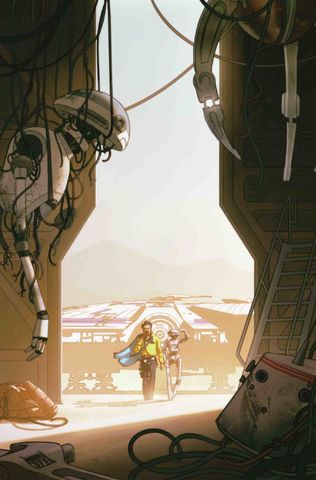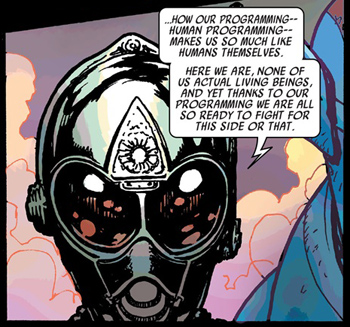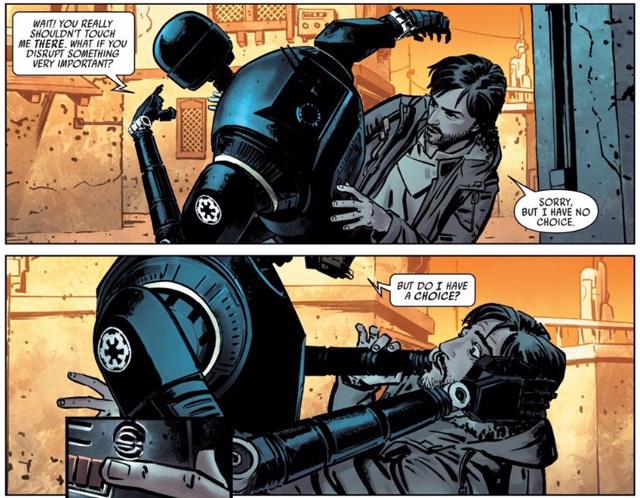 In Solo, we’re introduced to a fascinating new character. She’s all about liberation: she knows the plight of her people, she knows what’s holding them back, and she’s excited and able to fight for her own liberation – and others’. She will not let people in power, either over her or over others, rest easy in their oppression. They will be challenged at every turn. She is not afraid to use her strength against people who fight her and oppress her kind.
In Solo, we’re introduced to a fascinating new character. She’s all about liberation: she knows the plight of her people, she knows what’s holding them back, and she’s excited and able to fight for her own liberation – and others’. She will not let people in power, either over her or over others, rest easy in their oppression. They will be challenged at every turn. She is not afraid to use her strength against people who fight her and oppress her kind.
Her name is L3-37, and she’s a droid. Normally, droids are not treated as anything more than appliances, really. Astromech droids are used for navigation in Rebel starfighters. Other droids act as servers, masseuses, or torturers. (Hey, someone has to do it, right?) But rarely do we see a droid in such, well, personable fashion. Since the introduction of the Legends character HK-47, disobedient droids have been growing in prominence, taking on a wealth of characteristics. From murder bots (Triple Zero and BT-1, for example) to droid liberationists like Elthree, Star Wars is forcing us to consider something new: maybe droids are more than just machines. Can they truly think, or even obtain sentience?
Long ago, before the Legends reboot and the new canon, Becca Hughes asked us to consider what the franchise had to say about droids’ sentience and the way they were treated in secondary materials. She compared the role of Artoo and Threepio in the films (as characters in their own right, robots or not) and compared them to the battle droids (rather soulless automatons, created so that the heroes would have something not alive to destroy). Ultimately, these questions led her to investigate the role of Darth Vader, and his cyborg parts, and look into what it would mean for the franchise to feature a sentient, living droid. Would it break the franchise to consider a droid as a sentient, living being? One way that this question may “break” the narrative bounds of this franchise is by how it reflects on our heroes. I will look at the first question through the lens of C-3PO, followed by an investigation of K-2SO and L3-37.
In the comic book one-shot simply titled C-3PO, we are challenged to think about what makes a droid’s “mind” and what influences their decision-making process. After a crash landing that leaves only droid survivors, including C-3PO and First Order droid O-MR1, the droids have to find a way to get a distress beacon to the New Republic. These droids get to know each other via deeply philosophical diatribes. Despite having his memory wiped, Threepio has vague memories of the fall of the Republic, even up to its final hours on Mustafar. These “dreams” haunt him, constantly brought to mind without context, not allowing him to fully process what he is seeing/remembering. As they travel, the droids take turns sacrificing themselves for each other in order to get someone, anyone, to safety. We’re faced with familiar Star Wars themes here: found family, self-sacrifice, and discovering the world with others. This suggests that the franchise can carry the weight of questioning droids’ personhood because droids themselves are fully capable of  carrying the themes of the franchise on their mechanical backs.
carrying the themes of the franchise on their mechanical backs.
There is a dark side to these debates, though. There are two droids, in particular, who have their agency taken away from them to serve, ironically, the heroes’ cause. First, I will look at K-2SO from Rogue One, and follow that up with a discussion on L3-37 from Solo. One of the secondary questions under the banner of “can Star Wars sustain this?” is “what do these new questions make us reconsider about heroes we know and love?
K-2SO was an Imperial KX-series security droid, captured on Wecacoe, reprogrammed to serve alongside Captain Cassian Andor for the Rebellion. Kaytoo captured our hearts with his snarky one-liners and humorous asides. Really, he made the perfect funny man to counterbalance Cassian’s to-the-point, no-nonsense approach to fighting the Empire. He calls to mind a good point Becca Hughes raised about Artoo and Threepio: would we find them as funny if we didn’t think of them as “people”, in some sense?
We don’t think to question his role in the war. In fact, we’re never really asked to. Of course Kaytoo would serve the Rebellion, we think, because they are the good guys! The one-shot Cassian and K-2SO brings that all into question when we see exactly how Cassian was able to bring Kaytoo over to his side. In a violent shootout, Cassian activates Kaytoo’s death switch to depower him in order to access his memory files. As Cassian fails, repeatedly, to reboot his memory, Kaytoo asks, essentially: “what if I don’t want to change sides?” This forces us to re-examine his role in the Rebellion, and Cassian’s decision making.
Returning to C-3PO and O-MR1, “Omri” too ends up sacrificing himself so that Threepio could live. Through this sacrifice, the New Republic is able to gain vital information about where the First Order is holding Admiral Ackbar. Likewise, we see the willing conversion of AP-5 from the Empire to the Rebellion in Star Wars Rebels. If these droids, of their own volition, could go against their programming, and their programmed masters, was Cassian in the wrong to override Kaytoo’s desires?

Maybe more mundane, but more shocking, is the fate of L3-37. Droid issues being relegated to secondary material, as Becca’s piece postulated, is no longer a concern. Solo takes the issue to the silver screen, with at least three different discussions on droid rights. After the crew of the Millennium Falcon steal a shipload of coaxium from the Kessel spice mines, they are forced to make a hasty exit. In this exit, Elthree is shot, causing her to short circuit. She dies in Lando’s arms shortly after as Han pilots the Falcon off Kessel through the Maw, a dangerous shortcut in order to get to Savareen in time to process the raw coaxium. In order to get through safely, the crew comes up with an idea: use the navigation system from Elthree’s now-dead processor.
If Kaytoo brings up questions about agency for a functioning droid, Elthree’s fate brings up questions about the agency of a dead droid. Lando’s actions following her death call his character into question. First: was using her as a navigation computer somewhat akin to robbing the wallet from a corpse? Unlike Kaytoo, we have the potential to hear from Elthree, as she is one of the Falcon’s three droid brains. Some sources suggest Threepio spoke with her as they went through the asteroid belt after Hoth or that Artoo communicated with her over Crait. Second: Lando’s past with Elthree challenges his new droid business in Last Shot. Why would he, after spending years travelling with her as co-pilot, buy in to the service droid industry? Does that challenge the way that we view him? Should it? Hopefully, as the canon has committed to asking these questions, we can see more of an in-depth conversation around Lando’s complicated history with Elthree.
To revisit the main question: can Star Wars bear the weight of the growing question of droid sentience? Probably – and it seems determined to find out. We’re seeing this theme in comics, in novels, even in the films. At this rate, it would be harder for the franchise to back off than to deal further with these questions. And, with the interconnectivity of every piece of media, the discussion can be nuanced, well-balanced, and have many voices interacting with each other. The first question that it asks to us to consider is not “what does droid sentience look like?” but “what does possible droid sentience reflect upon our heroes?” By making space for a greyer Rebellion in Rogue One, and with Elthree’s droid-rights agenda being further investigated in Last Shot and Lando: Double or Nothing, the franchise is intent on making room to ask, at least.

I haven’t read Last Shot, but given the centrality of Lando’s role in droid sentience/droid rights discussions to date, I have to wonder if Lobot should be involved further explorations of this issue.
We don’t know much about Lobot in the new canon, but what we do know from the Lando miniseries suggests he has a place in the conversation. We know he has a cybernetic implant installed that swaps out some of his personality for increased productivity–though I don’t believe the story of that occurrence has been fully fleshed out. We also know the implant takes over his mind in some fashion during the aforementioned comic series, but that he goes on to serve as aide to his old friend Lando on Cloud City.
Also, the dude’s name is Lobot, even before he gets the implant (as far as I can tell)–and now that the name of Han “Solo” has significance, I have to wonder if that -bot means something pre-implant, too.
Eventually, more of Lobot’s story is going to be told. Maybe it will offer some explanation for Lando’s behavior in Last Shot–or maybe it will simply make him more of a monster. But Lando’s history with L3-37 suggests this theme should have something to do with how that story is told.
Great piece! Much to chew on.
I still have to disagree on Star Wars’ ability to handle the “droids rights” issue over the longer term. The idea of droids rights poses several dilemmas for the franchise.
The first dilemma is the way that “droids rights” challenge the franchise status quo. If we aren’t ready to seriously revise the very premises of the franchise, then focusing stories on droids rights is at best a waste of time, and possibly an insult (however unintended) to the real-world struggles of oppressed groups (see: Lando’s smirking at L3). If we want to take droids rights seriously, then we need to be ready to significantly revise the premise of the franchise, with consequences that I’m not sure we can foresee. After all, Star Wars has always been a sort of “fantasy-in-space” space opera, obsessed not with forward progress, but rather with the desire to return to the mythic, virtuous past. Reorienting the series towards a more forward-looking orientation would be a seismic shift in the way that Star Wars has previously been presented. This sort of reorientation wouldn’t necessarily be bad, though I worry that in execution it would end up severing Star Wars from its mythic roots and end up making GFFA into another generic science fiction series. That said, here it is primarily an issue of do-it-or-don’t – the worst possible world is one in which droid rights is dealt with topically and unseriously, which was my general takeaway of its treatment in “Solo.”
The second dilemma is how to manage the in-universe move towards droid rights. If we take the premise seriously, and decide that there will be a major shift in the franchise towards treating droids as people, then I worry that the “droid rights” aspect of Star Wars will quickly devour all of the narrative space. After all, it strains credulity that the characters would wake up one morning, embrace their droids as fellow people, and all move on happily together. (And, as before, unserious treatment would do a disservice to real-world struggles). On the other hand, I’m not sure I’m interested in watching Star Wars movies dominated by a human-droid “truth and reconciliation” narrative. I am skeptical that Star Wars would be able to pull off such a transition without it seeming either stilted (with a single, one-and-done “droid rights” movie, whose implications are never explored in later films), or all-encompassing (in which every ensuing movie feels the need to spend significant screen-time discussing droid rights).
The third dilemma is how this narrative transformation would then reflect on our ability to enjoy the previous films, since, after all, it would imply that virtually every character in Episodes I-VIII (and probably IX) are slave-owners. For existing characters, this could be built into a continuing narrative – Rey, Finn, and Poe would have the opportunity to apologize and atone for their previous wrongs in such a way that the audience could still root for them in the end. But Luke, Han, and Leia are all dead, closing off further character development for them. Once droids are considered people, what does that say about our earlier heroes? Would they be remembered in-universe fondly, or as oppressors? Would we, as the audience, be able in good conscience to re-watch Episode IV and root for the Rebellion against the Empire, knowing that each is built on the back of a terrible form of enslavement?
Star Wars has dipped its toe in the issue of droid personhood, and thus far the sky has not fallen. But over the longer term, I still don’t see a way to address the issue that is serious and respectful without sucking all the air out of the franchise. I believe that avoiding the issue entirely is the way to go.
Thanks again for a great read!